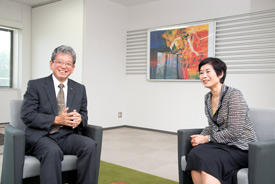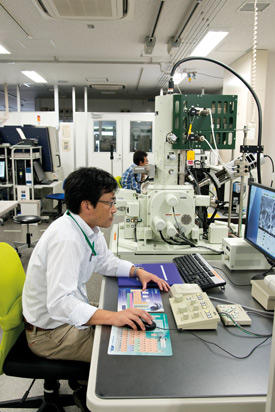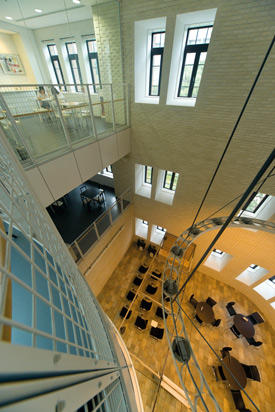

10/27/2014
Since its establishment in 2007 as a research institute in the Japanese government’s prestigious World Premier International Research Center Initiative (WPI), the AIMR has undertaken several reforms, which have helped it become one of the world’s leading materials research institutes. Tohoku University is very appreciative of the AIMR’s efforts and is now adopting the AIMR’s reforms to help it make a further leap forward. President of Tohoku University, Susumu Satomi, and the AIMR director, Motoko Kotani, discuss the outcomes of these reforms and their impact on the whole university as well as the future expectations of the university for the AIMR.

Satomi: Since its establishment, our university’s philosophy has always been to put research first, to maintain an open-door policy, and to emphasize practice-oriented research and education. As academia becomes increasingly global, Tohoku University needs to flexibly reform systems while maintaining our long-standing tradition in a bid to become a world-leading university. Since being appointed president in 2012, I have set two goals, namely achieving world-class status and spearheading the restoration of Tohoku and Japan after the Great East Japan Earthquake in March 2011. I announced the seven-point “Satomi Vision” to achieve these goals, which stresses the importance of system reforms.
Kotani: First, I would like to mention the introduction of a top-down system for making decisions. Unlike most Japanese universities, where decisions are generally made at faculty meetings, in the AIMR the director can make decisions at his/her discretion, enabling the institute to respond flexibly and rapidly. Since being appointed director in 2012, I have been trying to achieve breakthroughs by promoting collaborations between researchers in the fields of mathematics and materials. We are already seeing accelerated integration of different research fields and benefits over a short timescale as a result of this top-down decision making.
I also want to stress the reforms to the administrative division. In the past, I found it difficult to implement reforms due to red tape. But the AIMR’s administrative staff strongly desire to change the university, and they conduct their own work while implementing necessary reforms and supporting researchers. They established their own systems for inviting foreign researchers and organizing international symposiums, which had previously been done by researchers. This enables us to operate smoothly as an international research institute.
Satomi: In July 2014, Tohoku University set up the Organization for Advanced Studies (OAS), which will promote the internationalization of the university and its world-class advanced research. We plan to make the AIMR the first member of the OAS, and then allow other institutes to join. Furthermore, we will create a research reception center at the OAS by taking advantage of the knowledge that the AIMR has accumulated. The establishment of the OAS is the biggest outcome that the AIMR’s reforms have brought to our university.
Kotani: Thank you very much. I am very gratified to know that our efforts have brought concrete outcomes and have contributed to the further development of the university.

Kotani: One of the AIMR’s missions as a WPI research institute was to recruit outstanding researchers from around the world. To achieve this, we had to offer high levels of compensation. In light of the intensifying global competition in recruiting researchers, I felt strongly that we would be unable to conduct top-level research and attract excellent researchers and students unless we provided them with more incentives than previously.
The AIMR first established a merit-based pay system based on annual appraisals and achievements of researchers in an effort to raise their motivation levels. AIMR researchers can negotiate all sorts of conditions, including payment and research environment. I think that this system is one reason why the AIMR is successful. We have also introduced a joint appointment system, in which excellent researchers affiliated with other departments at Tohoku University and other institutions can concurrently serve as principal investigators at the AIMR.
Satomi: Traditionally, Japanese universities have not set salaries based on the achievements of researchers. Tohoku University has introduced a distinguished professor system modeled on the AIMR’s pay system; it allows high-level professors to receive salary bonuses. Tohoku University must lead other universities by taking advantage of the joint appointment system. We have formed a project team to discuss how to become a hub of the global circulation of talented researchers.
Kotani: Providing research support in English was another important mission as a WPI research institute. This was mostly realized in the early stages of establishing the AIMR. Over 90% of our administrative staff can speak Japanese and English, and daily announcements and information about grant applications are provided in both languages. In addition, we have established a system that allows all researchers, including non-Japanese speakers, to easily perform various administrative procedures. One reform I have undertaken since becoming director was establishing the Research Support Center. The center provides fundamental analytical equipment that is used by most researchers. Staff with a PhD provide support in English, allowing researchers to commence fully fledged research immediately on arriving at the AIMR.
Satomi: Administrative support in English is also essential for Tohoku University to become a truly international university, and I’m thankful to the AIMR for heralding the move. The impact is spreading across the university as some of the AIMR’s administrative staff have moved to other departments.
Kotani: We have recently started sharing our administrative expertise with other departments of the university. Examples include secretarial manuals and examples of emails when communicating with overseas research institutes and researchers. We are doing our very best to contribute to the university.

Kotani: We have implemented many other reforms in addition to those we have discussed. For example, we have created a common space that all of the AIMR staff and researchers can use freely with the aim of fostering interaction between them. Such an open atmosphere was difficult to establish when traditional Japanese culture prevailed, but we consider it to be an essential element for progressing research. We use the space for various events, such as Tea Time every Friday and research presentations and seminars by guest researchers to strengthen interactions. The resulting connectivity has already proved effective for driving collaborative research.
Satomi: Finally, I would like to mention that, in addition to the system reforms, the AIMR has also greatly contributed to the university educationally. We are currently establishing a graduate school that specializes in spintronics — an area where Tohoku University leads the world — thanks to the advanced research at the AIMR and the global connections of its researchers. I am very grateful for that. By actively adopting successful reforms of the AIMR, Tohoku University will continue to become a world-class university and function as a hub for international talent.